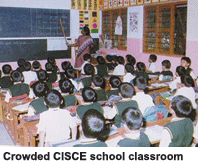Although the academic year 2011 is still six months away, the great majority of upscale (CBSE, CISCE and CIE affiliated) schools in Bangalore (pop. 7 million) have already finalised or are about to close nursery and class I admissions of the next academic year starting in June 2011.
 According to sources in the Karna-taka state government’s education department, the 218 CISCE and CBSE affiliated schools in the state are not obliged to follow the admissions calendar of the state government’s department of public instruction (DPI), which has decreed that all unaided and aided schools affiliated with the Karnataka Secondary Education Examination Board (KSEEB) cannot start the admissions process for the academic term beginning June every year, before April 1. “Every year we receive complaints from parents about ICSE and CBSE schools closing admissions early. But we have no control over these schools. If I receive such complaints the best I can do is forward them to the Centre,” said R.G. Nadadur, principal secretary, education department, in an interview to DNA (November 24).
According to sources in the Karna-taka state government’s education department, the 218 CISCE and CBSE affiliated schools in the state are not obliged to follow the admissions calendar of the state government’s department of public instruction (DPI), which has decreed that all unaided and aided schools affiliated with the Karnataka Secondary Education Examination Board (KSEEB) cannot start the admissions process for the academic term beginning June every year, before April 1. “Every year we receive complaints from parents about ICSE and CBSE schools closing admissions early. But we have no control over these schools. If I receive such complaints the best I can do is forward them to the Centre,” said R.G. Nadadur, principal secretary, education department, in an interview to DNA (November 24).
However the 7,854 private unaided and aided schools affiliated with KSEEB are usually the last choice of aspirational middle class parents with free-of-charge government schools contemptuously ruled out. Therefore for parents who miss the September-October rush for admission into CBSE/CISCE schools, the next three months are an anxious time of reduced choice and panic, prompting desperate parents to pull every string to get their children into the city’s top-ranked schools. During the peak admissions season (November-February) Bangalore’s top schools transform into fortresses with panic-stricken parents braving serpen-tine admission queues and jamming telephone lines forcing principals, faculty and school trustees to go into hiding. Often money changes hands under and over tables.
Though every middle class parent is aware of the worsening demand-supply balance of acceptable quality primary and secondary schools, politicians and bureaucrats in the education ministry of the southern state of Karnataka (pop.57 million) seem unperturbed by this annual stampede for school admission. On the contrary, the state’s education depart-ment has imposed a plethora of restrictions on the promotion of quality (aka English medium) private schools preferred by the public, especially the fast-expanding middle class. Education entrepreneurs ready, willing and able to cater to the rising demand for private English medium schools are confronted with myriad hurdles strewn in their path by the state’s notoriously venal politician-bureaucrat nexus, intent upon extracting bribes at every opportunity. An RTI (Right to Information) Act query filed by EducationWorld indicates that edupreneurs have to obtain seven clearances — all discretionary — to start primary/secondary schools.
Moreover according to a state government ordinance of 1994, all primary schools promoted after that year are obliged to make Kannada or the mother tongue the medium of instruction in classes I-V — a law practiced more in the breach than observance, with pay offs to education department officials the rule. Although after prolonged litigation the Karnataka high court struck down this language policy in July 2008 on the ground that parents have a fundamental right to choose the medium of instruction they deem fit for their children, the state government’s education ministry stubbornly refuses to issue the all-important NOC (no objection certificate) for English medium primary schools in the state.
“On average for every one seat in a CBSE/CISCE school in Bangalore there are 90 applications. In this situation there’s no option but to increase the supply of new schools. Given the pressing public demand for English medium schools, the state education department is obliged by law and democracy norms to permit promotion of English medium schools as well as simplify the entire process of promoting new schools. In fact it must give edupreneurs incentives and tax breaks for investing in greenfield schools,” advises Prof. A.S. Seetharamu, former professor of education at the Institute of Social and Economic Change, Bangalore.
With pressure for English medium education being exerted even by bottom-of-the-pyramid households, the shackles imposed upon edupreneurs by the state government’s obdurate politician-bureaucrat nexus will be broken sooner rather than later. But until then school admis-sions will remain a stressful ordeal for parents aspiring to high quality K-12 education for their children.
Summiya Yasmeen (Bangalore)